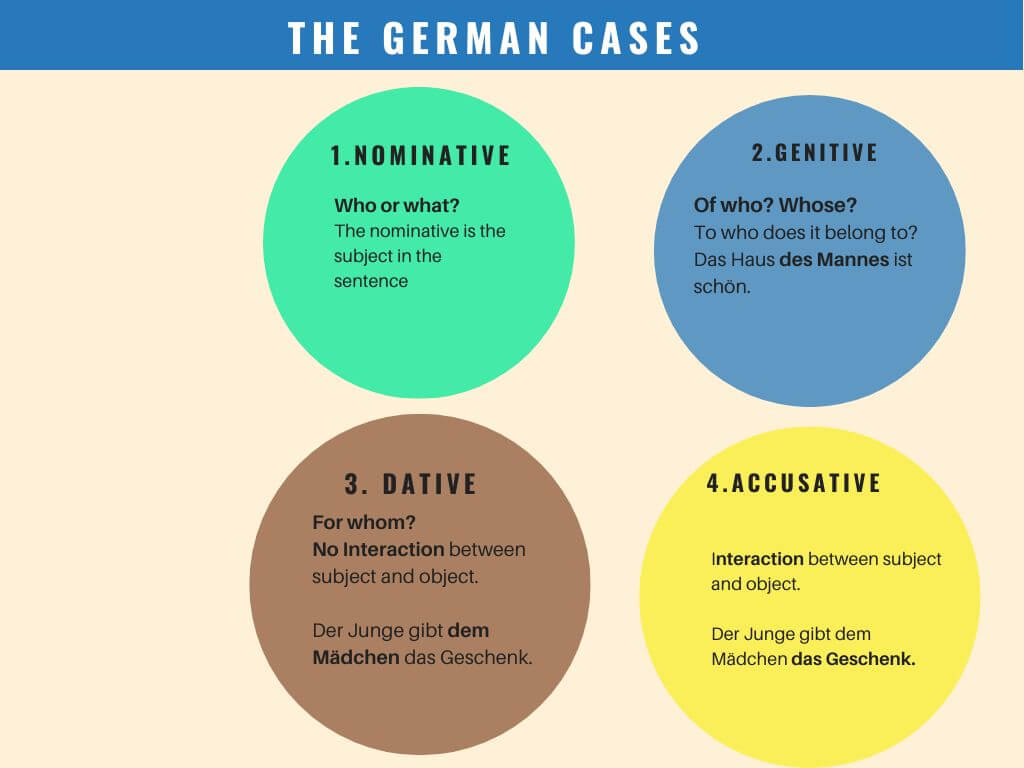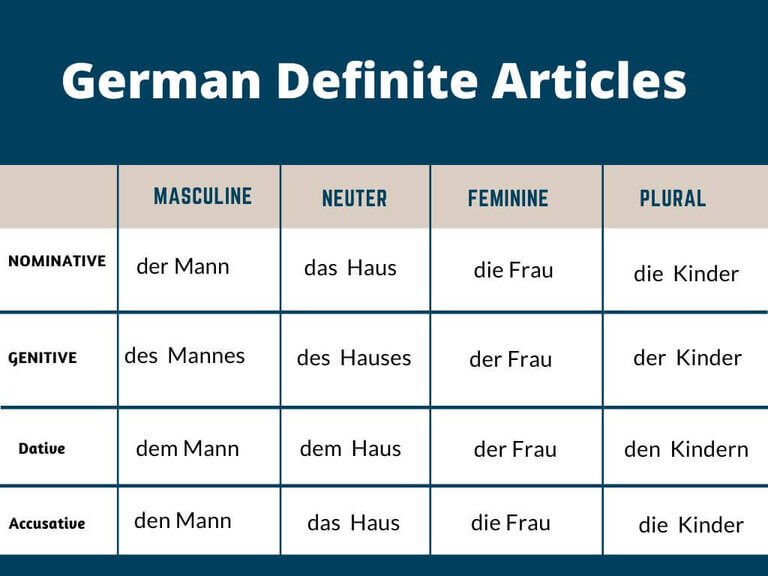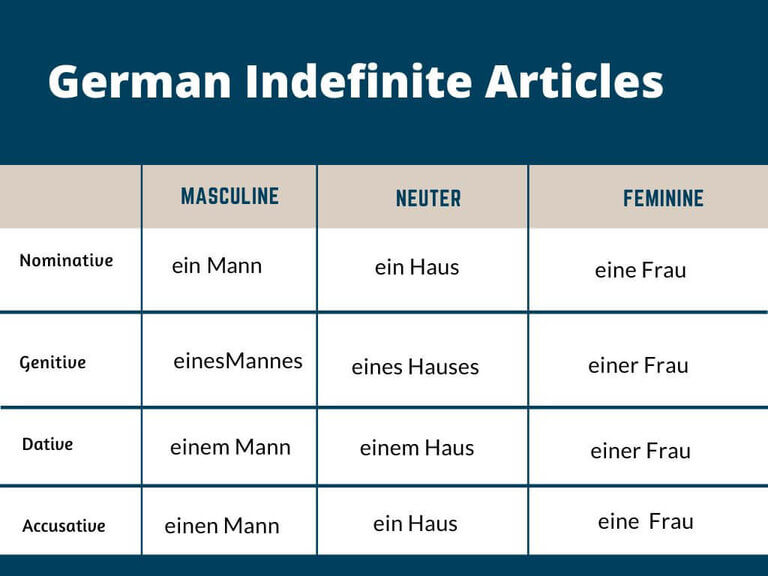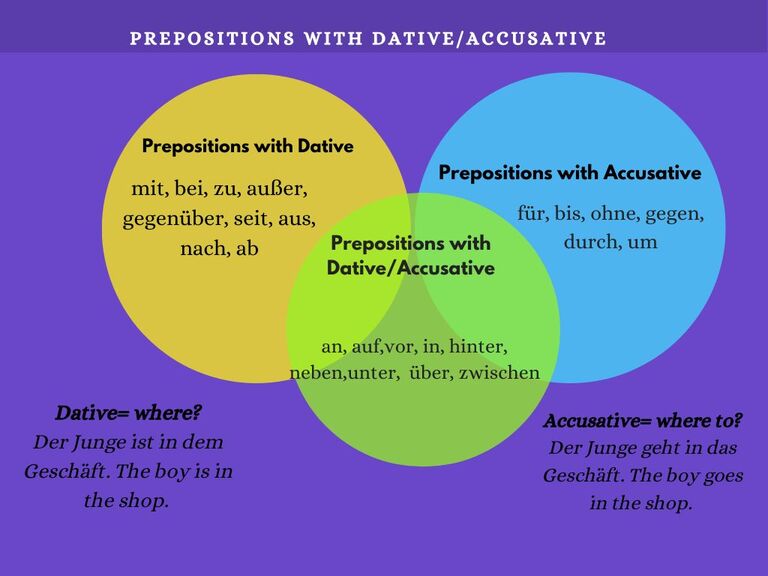Table of Contents
Introduction of German Cases
German has four main cases: nominative, genitive, dative, and accusative. These cases show the relationship between nouns, pronouns, adjectives, and other words in a sentence. Mastering them makes communication more accurate and natural. This article explains each case, shares examples, and offers tips for learning.
German Cases Chart

The chart above provides a quick view of the four German cases. In the sections below, you will find more details, examples, and practice resources.
Nominative Case
The nominative case marks the subject of a sentence—the person or thing performing the action. You can ask “Who?” or “What?” to find the nominative. A deeper look is available here:
nominative in German.
Examples:
| Nominativ | Beispielsatz |
|---|---|
| Der Mann | Der Mann geht spazieren. |
| Die Frau | Die Frau lächelt. |
| Das Kind | Das Kind spielt. |
| Die Katze | Die Katze schläft. |
| Der Hund | Der Hund bellt. |
| Der Lehrer | Der Lehrer unterrichtet. |
| Die Schülerin | Die Schülerin lernt. |
| Das Auto | Das Auto fährt. |
| Die Blume | Die Blume blüht. |
| Der Vogel | Der Vogel singt. |
German Nominative Quiz
Test your knowledge with a free nominative Quiz.
Genitive Case
The genitive case shows possession or relationships between nouns. More details:
german genitive.
Examples:
| Genitiv | Beispielsatz |
|---|---|
| des Mannes | Das Auto des Mannes ist blau. |
| der Frau | Die Tasche der Frau ist rot. |
| des Kindes | Das Spielzeug des Kindes liegt auf dem Boden. |
| der Katze | Die Schüssel der Katze ist leer. |
| des Hundes | Die Leine des Hundes ist lang. |
| des Lehrers | Das Buch des Lehrers ist interessant. |
| der Schülerin | Die Hausaufgaben der Schülerin sind fertig. |
| des Autos | Die Farbe des Autos ist grün. |
| der Blume | Der Duft der Blume ist betörend. |
| des Vogels | Das Lied des Vogels ist wunderschön. |
Learn More About the Genitive Case: Quiz, Verbs, and Prepositions
Practice your skills with this genitive quiz. You can also check out genitive verbs and
genitive prepositions if you want to go deeper.
Dative Case
The dative case represents an indirect object. You can ask “to whom?” or “for whom?” to identify it. Read more: dative in German. Some specific dative verbs always require the dative. And dative prepositions also force nouns or pronouns into the dative.
Examples:
| Dativ | Beispielsatz |
|---|---|
| dem Mann | Ich gebe dem Mann ein Geschenk. |
| der Frau | Sie hilft der Frau beim Einkaufen. |
| dem Kind | Er liest dem Kind eine Geschichte vor. |
| dir | Ich antworte dir. |
| der Mutter | Der Junge glaubt der Mutter. |
| dem Lehrer | Die Schülerin gibt dem Lehrer das Heft. |
| der Schülerin | Der Lehrer erklärt der Schülerin die Aufgabe. |
| dem Auto | Er stellt sein Fahrrad neben dem Auto ab. |
| der Blume | Sie gießt Wasser neben der Blume. |
| ihr | Du stimmst ihr zu. |
Dative Quiz
Practice your understanding with our free dative quiz.
Accusative Case
The accusative case often identifies the direct object. You can ask “whom?” or “what?” to recognize it. For more details: accusative in German.
Dative vs Accusative
If you find it tricky to decide between accusative or dative, you can read:
dative vs. accusative or test yourself with the dative vs. accusative quiz.
| Akkusativ | Beispielsatz |
|---|---|
| den Ball | Ich werfe den Ball. |
| die Blume | Er pflückt die Blume. |
| das Buch | Sie liest das Buch. |
| die Katze | Wir streicheln die Katze. |
| den Hund | Sie füttert den Hund. |
| den Kuchen | Er isst den Kuchen. |
| das Auto | Ich wasche das Auto. |
| die Jacke | Du trägst die Jacke. |
| den Stuhl | Sie stellt den Stuhl um. |
| die Flasche | Er öffnet die Flasche. |
German Accusative Quiz
Did you get the hang of the accusative in German? Awesome! If you want to double-check, take our newest quiz on the accusative case.
German Articles in Different Cases
German articles reflect the case, number, and gender of the noun they introduce. Definite articles (der, die, das) and indefinite articles (ein, eine) will change form depending on whether the noun is in the nominative, genitive, dative, or accusative case.
For example, the masculine nominative article der becomes den in the accusative and dem in the dative. Likewise, the masculine indefinite article ein changes to einen in the accusative and einem in the dative.
Learning these variations helps you speak and write more precisely. Here is a brief overview:
Definite Articles Chart

The image above shows how definite articles (der, die, das) change for each case. Below is another image for indefinite articles:
Indefinite Articles Chart

As you see, ein (masculine nominative) becomes einen in the accusative. This shift helps indicate the role the noun plays in the sentence. Mastering these article forms is a vital step in understanding and using German grammar correctly.
Using Cases with German Prepositions

Some prepositions always take dative or accusative. Others (two-way prepositions) can be used with either case, depending on whether the meaning indicates location or motion.
Dative Prepositions
Dative prepositions include “mit,” “bei,” “zu,” “von,” and others. For example: “Ich gehe mit dem Hund spazieren.”
Accusative Prepositions
Accusative prepositions include “für,” “bis,” “ohne,” “durch,” and others. For example: “Das Geschenk ist für die Frau.”
Two-Way Prepositions
Two-way prepositions can take either dative or accusative. For example: “Das Buch liegt in der Tasche” (dative: location) vs. “Ich lege das Buch in die Tasche” (accusative: locomotion).
Practice with the free German Two-Way Prepositions Quiz.
Genitive Prepositions
These genitive prepositions are the most common ones. They are normally used with a genitive, but in the spoken language people tend to use a dative for some of these prepositions instead.
Cases and German Pronouns
German personal pronouns change form depending on the case. For instance, “ich” becomes “mich” in the accusative and “mir” in the dative.
| Nominative | Dative | Accusative | |
|---|---|---|---|
| 1st Person (I) | ich | mir | mich |
| 2nd Person (you) | du | dir | dich |
| 3rd Person (he) | er | ihm | ihn |
| 3rd Person (she) | sie | ihr | sie |
| 3rd Person (it) | es | ihm | es |
| 1st Person Plural (we) | wir | uns | uns |
| 2nd Person Plural (you all) | ihr | euch | euch |
| 3rd Person Plural (they) | sie | ihnen | sie |
| Formal (Sie) | Sie | Ihnen | Sie |
Reviewing these forms helps avoid confusion and keeps your sentences clear.
Tips for Mastering German Cases
- Focus on each case’s function (subject, object, possession).
- Learn how articles and pronouns change in each case.
- Study which verbs and prepositions require specific cases.
- Write and speak in German, checking your case usage carefully.
- Use grammar quizzes to practice regularly.
Common Mistakes to Avoid
- Mixing dative and accusative objects.
- Forgetting to decline articles and pronouns correctly.
- Applying the wrong case after a preposition.
- Using two-way prepositions incorrectly (location vs. motion).
Conclusion
German cases are key to clear communication. By learning how the nominative, genitive, dative, and accusative work, you can build sentences that reflect correct relationships among subjects, objects, and possessions. Regular practice with articles, pronouns, and prepositions will help you gain confidence in using German cases.
Continue Learning German – Resources & Lessons
- Grammar Articles Overview
- Vocabulary Articles Overview
- Vocabulary Quizzes
- Grammar Quizzes
- German Short Stories
- Book a Private Onlin
German Cases: Frequently Asked Questions
What are the Four German Cases?
They are nominative (subject), genitive (possession), dative (indirect object), and accusative (direct object).
Why are Cases so Important?
Cases show how words relate to each other in a sentence. Using the right case ensures clarity and accuracy.
How can I Practice German Cases Effectively?
Do writing exercises, speak with native speakers, and try targeted quizzes. Focus on prepositions, verbs, and their required cases.
Why do Articles and Pronouns change Form?
German is an inflected language. Words adapt their endings to reflect their case-based role in the sentence.
Which Case is Used with Two-Way Prepositions?
It depends on whether you describe a location (dative) or a destination (accusative).
Any Tips for Remembering Dative versus Accusative?
Think of dative as “to whom” or “for whom” and accusative as “whom” or “what.” Also check if the verb implies locomotion (accusative) or location (dative).
Can I skip learning the Genitive because some Germans replace it with Dative?
Modern spoken German sometimes replaces genitive with dative, but formal and written contexts still expect correct genitive usage, that is why it makes sense to learn it.
Do Cases also have an Impact on Adjective Endings?
Yes, the German language has adjective declension, meaning adjective endings change based on case, number, and whether they follow an article, pronoun, or no article at all.

